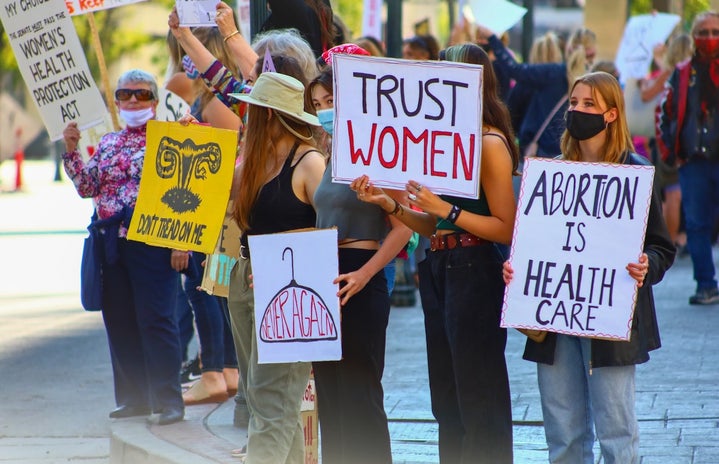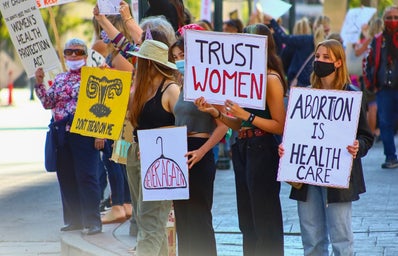“Take the ban off our bodies”
As many of us are aware, a leaked U.S. Supreme Court document planning to overturn “Roe vs Wade” abortion rights have American women facing huge anxieties. Overturning “Roe vs Wade” means that women will lose their rights to make decisions for themselves about their own bodies. It means that women’s bodies will be subjected to the control of the state, as it positions “the states to decide on the fate of reproductive rights” (Moseley, 2022).
For context, the “Roe vs Wade” pro-choice law provided women with rights to their own bodies in a 1973 US Supreme Court lawsuit. At the time, abortion was illegal in Texas making getting an abortion a crime. Jane Roe – a pseudonym used to protect the woman’s privacy – filed suit on behalf of herself and other women to challenge Texan abortion laws, and she succeeded. “Roe vs Wade” was legislated as federal law, making abortion legal throughout America. But now it looks like American women once again have to protest the government to “take the ban off their bodies”. These recently leaked documents plan for a blanket ban on all abortion regardless of circumstance, even including pregnancies as a result of rape and incest.
Here in South Africa, while we might not always have lights, we do have abortion rights. South Africa’s Choice on Termination of Pregnancy Act No. 92 of 1996, ensures that all women have the right to a free abortion at government clinics or hospitals during their first 12 weeks of pregnancy. The act emphasises that all women are given the right to terminate a pregnancy regardless of their age. Even minors will be assisted as the act states that, “provisions will be made for girls who are not accompanied by an adult” (Western Cape Government, 2022).
The act states that a termination of pregnancy can also be performed from the 13th to the 20th week of pregnancy if the pregnancy entails medical concerns for the mother and her/their doctor. These concerns consist of the following: risk of injury to the woman’s mental or physical health; risk that the foetus would suffer from a severe mental or physical abnormality; if pregnancy has resulted from incest or rape and if the pregnancy is going to affect or impact the economic or social circumstances of the woman. The act extends to providing termination of pregnancy after the 20th week if a doctor believes that the pregnancy is going to result in malformation of the foetus; if the pregnancy is going to endanger the mother’s life and if the pregnancy poses a risk of injury to the foetus. Whether it’s a concern about the physical state of the mother or the foetus, or about the mental state or anxieties around the economic and social factors of raising a child, women are given the full freedom to make a choice about what they believe is best for them.
It’s important to note that South African rights to abortion also ensure that safe abortion procedures can take place. The banning of abortion will never stop abortions from happening: it will only stop safe abortion procedures from being conducted. This can result in detrimental damage to the lives and bodies of women. South Africa offers safe and legal abortion methods including medical and surgical procedures that can be performed at clinics and hospitals. A medical abortion involves the use of medication to induce labour and thus induce symptoms of a miscarriage. Surgical abortions are performed by qualified nurses and doctors in a clinic or hospital. Surgical abortions take place in one day and after the procedure, the woman will be able to go home “once her vital signs are normal” (Western Cape Government, 2022).
Whilst we do have abortion rights, it is mentioned that not all health care workers will be pro-choice, but they are obligated by law to “inform the client of her rights and must refer the client to a health worker or facility” (Western Cape Government, 2022) where she/they can receive the service she/they needs.
If you need an abortion in South Africa, you will likely be asked to show the following: a referral letter from your doctor (if it is relevant); any medication you are on; an informed consent form giving your permission for the procedure to take place.
Pro-choice legislature ultimately allows a woman to make that choice for herself/themself. It is not necessarily pro-abortion. A termination of pregnancy is likely fraught with emotion and complexity. Pro-choice also allows a woman the choice to carry a pregnancy to term despite the circumstances of conception if that is her/their decision.
“The decision whether or not to bear a child is central to a woman’s life, to her well-being and dignity. It is a decision she must make for herself.” – Ruth Bader Ginsburg.
Sources
Moseley, T. 2022. At “Bans off our Bodies” Rallies, Abortion-Rights Supporters Express Anger, Defiance, and Unity. Available: https://www.vanityfair.com/news/2022/05/bans-off-our-bodies-rallies-abortion-rights-supporters-express-anger-defiance-and-unity (2022, May 24).
Western Cape Government. 2022. Termination of Pregnancy (TOP). Available: https://www.westerncape.gov.za/service/termination-pregnancy-top (2022, May 24).


